Hospitality Management: CRM and Revenue Generation Research Proposal
VerifiedAdded on 2023/01/17
|9
|1913
|67
Project
AI Summary
This research proposal investigates the impact of Customer Relationship Management (CRM) on revenue generation within the hospitality industry, using the Sultan Hotel in London as a case study. The introduction highlights the importance of CRM in enhancing customer satisfaction and fostering stronger customer relationships. The proposal outlines objectives to identify CRM concepts, analyze their impact on revenue, pinpoint implementation challenges, and recommend solutions. The literature review explores CRM strategies, its integration with revenue generation, and potential obstacles. The methodology section details the research philosophy, data collection methods (primary and secondary), sampling techniques, data analysis approach, and ethical considerations. The study employs interpretivism and utilizes questionnaires and secondary sources for data collection, with purposive sampling of 30 Sultan Hotel employees. Thematic analysis will be used to interpret qualitative data. The research aims to provide insights into CRM's effectiveness in the hospitality sector and offers a comprehensive overview of the research process. The references include books, journals, and online resources related to CRM and hospitality management. The research concludes that CRM is beneficial for revenue improvement.
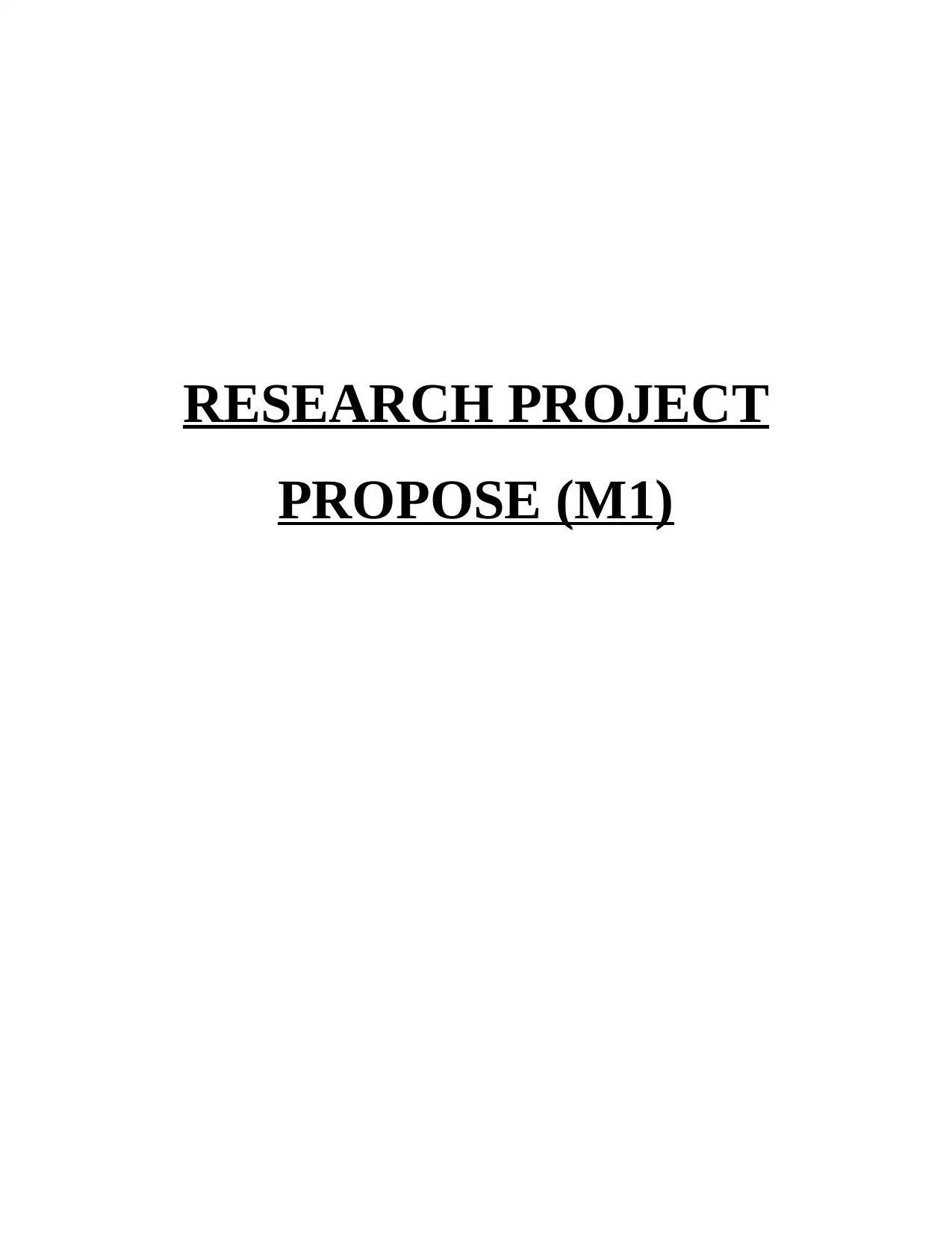
RESEARCH PROJECT
PROPOSE (M1)
PROPOSE (M1)
Paraphrase This Document
Need a fresh take? Get an instant paraphrase of this document with our AI Paraphraser
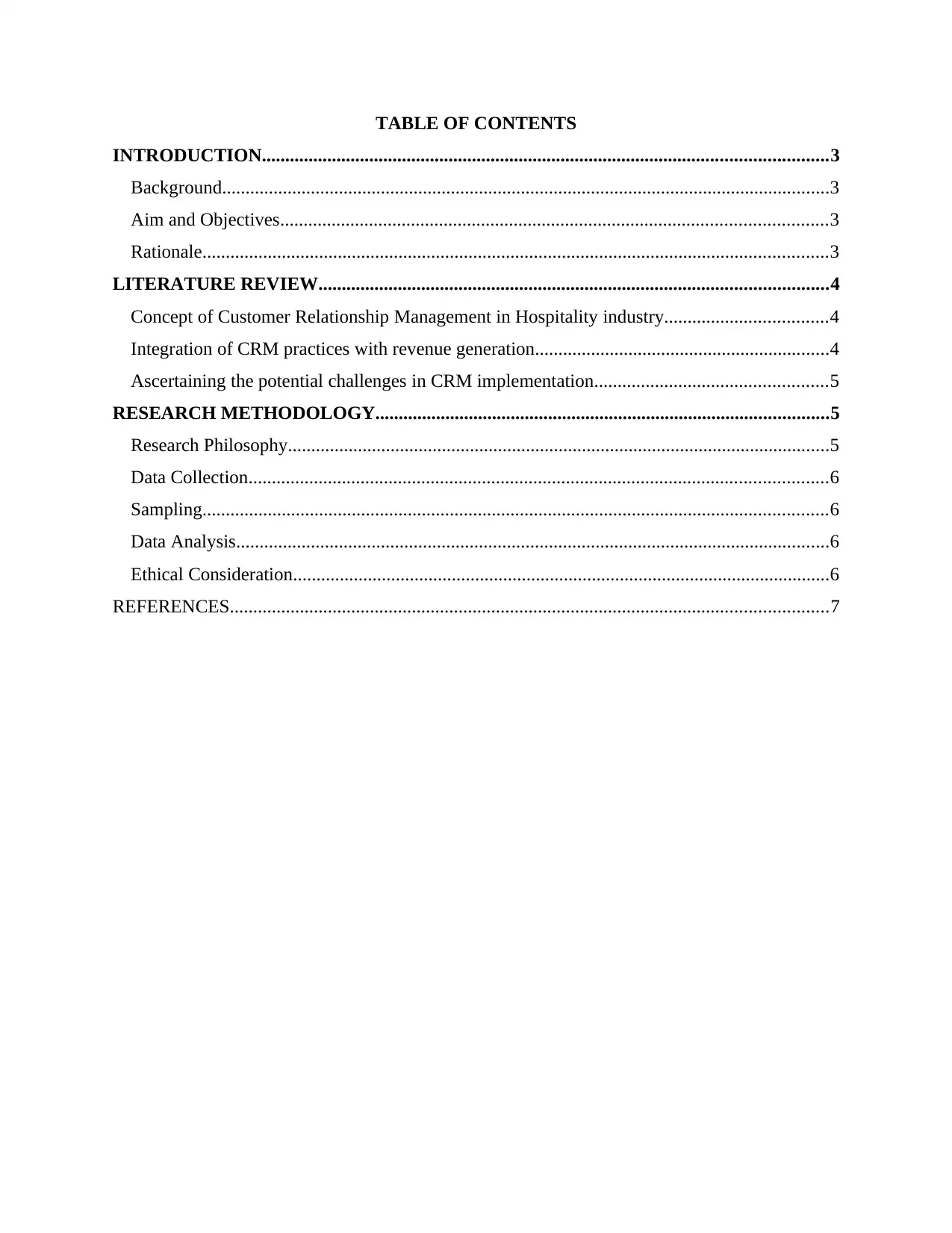
TABLE OF CONTENTS
INTRODUCTION.........................................................................................................................3
Background..................................................................................................................................3
Aim and Objectives.....................................................................................................................3
Rationale......................................................................................................................................3
LITERATURE REVIEW.............................................................................................................4
Concept of Customer Relationship Management in Hospitality industry...................................4
Integration of CRM practices with revenue generation...............................................................4
Ascertaining the potential challenges in CRM implementation..................................................5
RESEARCH METHODOLOGY.................................................................................................5
Research Philosophy....................................................................................................................5
Data Collection............................................................................................................................6
Sampling......................................................................................................................................6
Data Analysis...............................................................................................................................6
Ethical Consideration...................................................................................................................6
REFERENCES................................................................................................................................7
INTRODUCTION.........................................................................................................................3
Background..................................................................................................................................3
Aim and Objectives.....................................................................................................................3
Rationale......................................................................................................................................3
LITERATURE REVIEW.............................................................................................................4
Concept of Customer Relationship Management in Hospitality industry...................................4
Integration of CRM practices with revenue generation...............................................................4
Ascertaining the potential challenges in CRM implementation..................................................5
RESEARCH METHODOLOGY.................................................................................................5
Research Philosophy....................................................................................................................5
Data Collection............................................................................................................................6
Sampling......................................................................................................................................6
Data Analysis...............................................................................................................................6
Ethical Consideration...................................................................................................................6
REFERENCES................................................................................................................................7
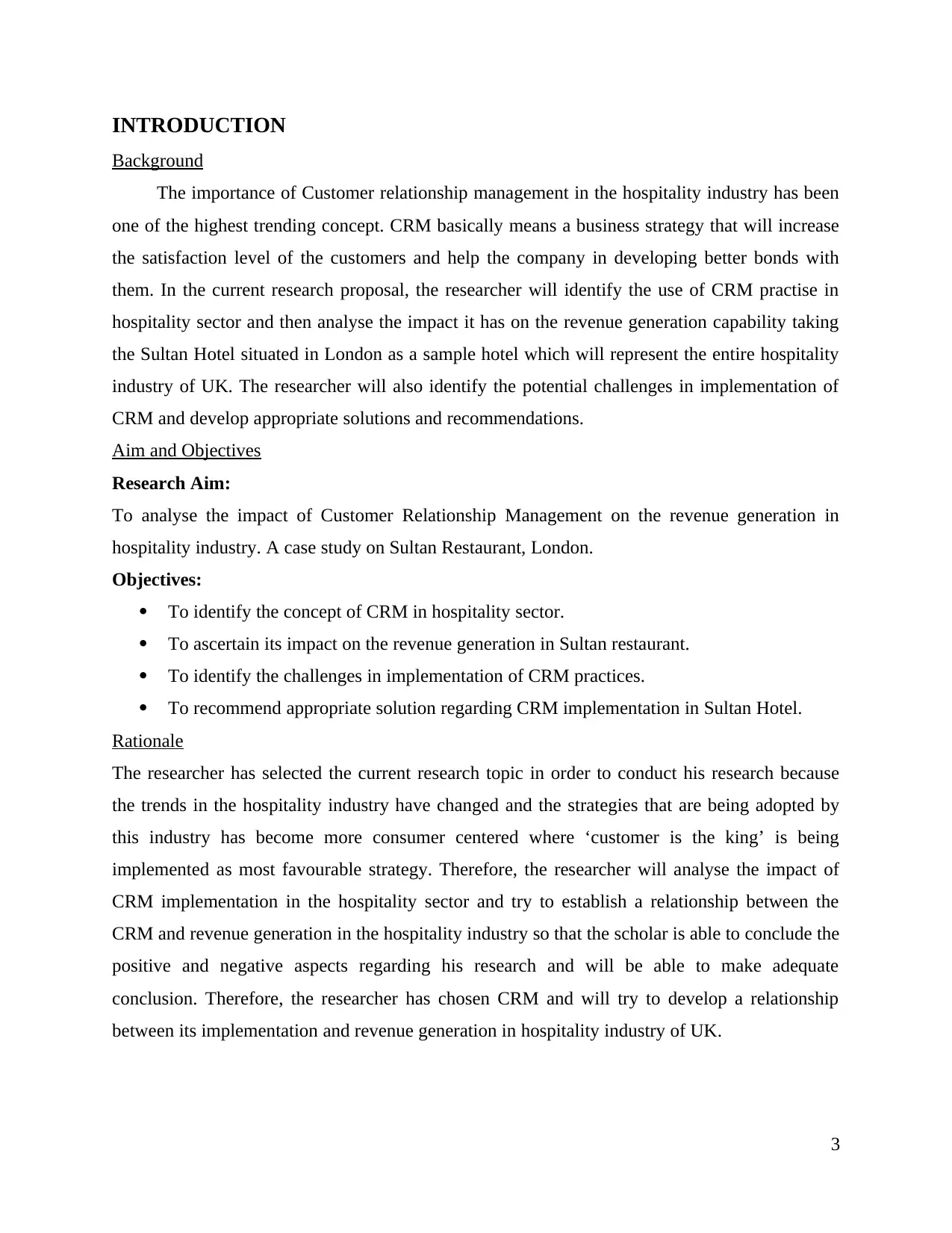
INTRODUCTION
Background
The importance of Customer relationship management in the hospitality industry has been
one of the highest trending concept. CRM basically means a business strategy that will increase
the satisfaction level of the customers and help the company in developing better bonds with
them. In the current research proposal, the researcher will identify the use of CRM practise in
hospitality sector and then analyse the impact it has on the revenue generation capability taking
the Sultan Hotel situated in London as a sample hotel which will represent the entire hospitality
industry of UK. The researcher will also identify the potential challenges in implementation of
CRM and develop appropriate solutions and recommendations.
Aim and Objectives
Research Aim:
To analyse the impact of Customer Relationship Management on the revenue generation in
hospitality industry. A case study on Sultan Restaurant, London.
Objectives:
To identify the concept of CRM in hospitality sector.
To ascertain its impact on the revenue generation in Sultan restaurant.
To identify the challenges in implementation of CRM practices.
To recommend appropriate solution regarding CRM implementation in Sultan Hotel.
Rationale
The researcher has selected the current research topic in order to conduct his research because
the trends in the hospitality industry have changed and the strategies that are being adopted by
this industry has become more consumer centered where ‘customer is the king’ is being
implemented as most favourable strategy. Therefore, the researcher will analyse the impact of
CRM implementation in the hospitality sector and try to establish a relationship between the
CRM and revenue generation in the hospitality industry so that the scholar is able to conclude the
positive and negative aspects regarding his research and will be able to make adequate
conclusion. Therefore, the researcher has chosen CRM and will try to develop a relationship
between its implementation and revenue generation in hospitality industry of UK.
3
Background
The importance of Customer relationship management in the hospitality industry has been
one of the highest trending concept. CRM basically means a business strategy that will increase
the satisfaction level of the customers and help the company in developing better bonds with
them. In the current research proposal, the researcher will identify the use of CRM practise in
hospitality sector and then analyse the impact it has on the revenue generation capability taking
the Sultan Hotel situated in London as a sample hotel which will represent the entire hospitality
industry of UK. The researcher will also identify the potential challenges in implementation of
CRM and develop appropriate solutions and recommendations.
Aim and Objectives
Research Aim:
To analyse the impact of Customer Relationship Management on the revenue generation in
hospitality industry. A case study on Sultan Restaurant, London.
Objectives:
To identify the concept of CRM in hospitality sector.
To ascertain its impact on the revenue generation in Sultan restaurant.
To identify the challenges in implementation of CRM practices.
To recommend appropriate solution regarding CRM implementation in Sultan Hotel.
Rationale
The researcher has selected the current research topic in order to conduct his research because
the trends in the hospitality industry have changed and the strategies that are being adopted by
this industry has become more consumer centered where ‘customer is the king’ is being
implemented as most favourable strategy. Therefore, the researcher will analyse the impact of
CRM implementation in the hospitality sector and try to establish a relationship between the
CRM and revenue generation in the hospitality industry so that the scholar is able to conclude the
positive and negative aspects regarding his research and will be able to make adequate
conclusion. Therefore, the researcher has chosen CRM and will try to develop a relationship
between its implementation and revenue generation in hospitality industry of UK.
3
⊘ This is a preview!⊘
Do you want full access?
Subscribe today to unlock all pages.

Trusted by 1+ million students worldwide
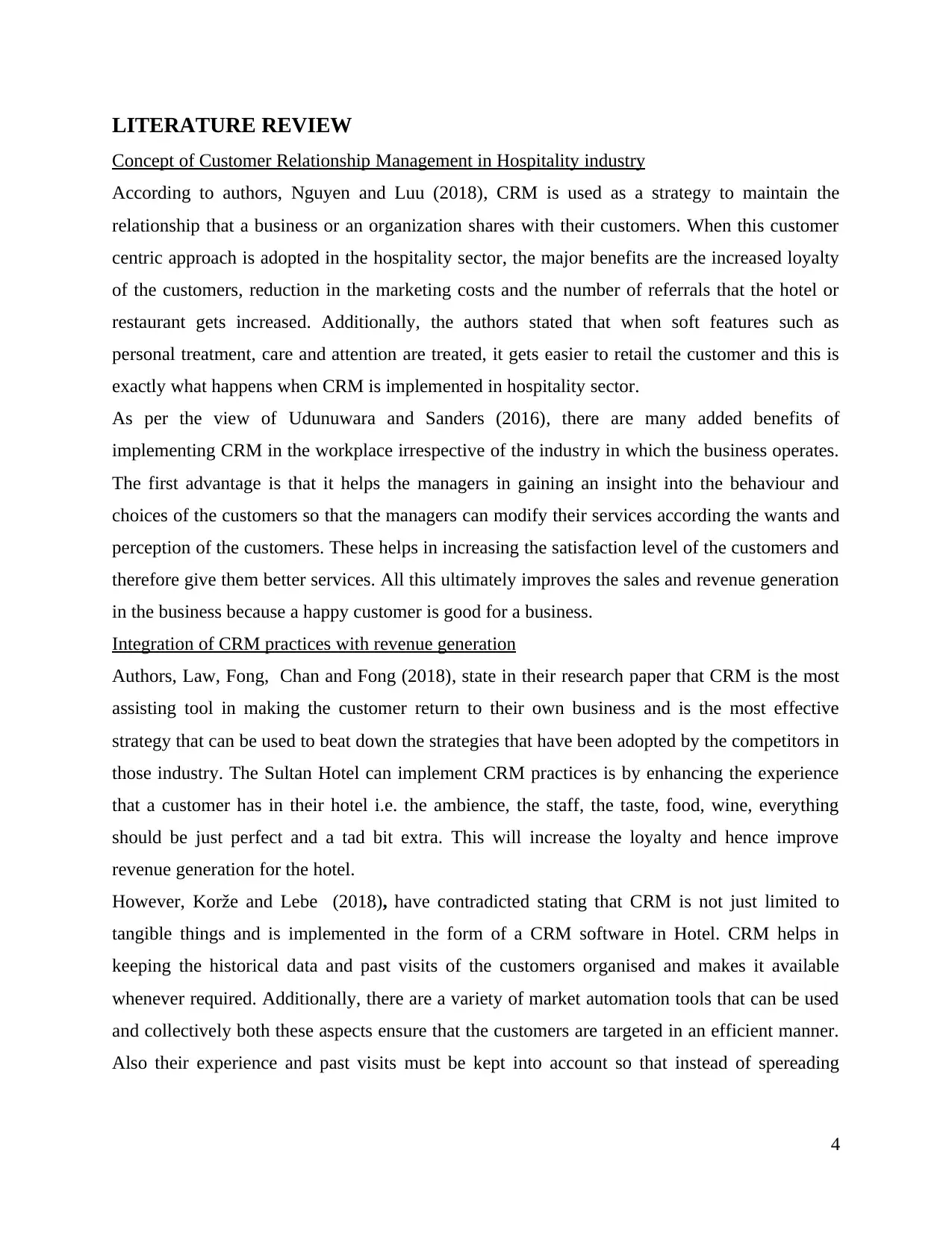
LITERATURE REVIEW
Concept of Customer Relationship Management in Hospitality industry
According to authors, Nguyen and Luu (2018), CRM is used as a strategy to maintain the
relationship that a business or an organization shares with their customers. When this customer
centric approach is adopted in the hospitality sector, the major benefits are the increased loyalty
of the customers, reduction in the marketing costs and the number of referrals that the hotel or
restaurant gets increased. Additionally, the authors stated that when soft features such as
personal treatment, care and attention are treated, it gets easier to retail the customer and this is
exactly what happens when CRM is implemented in hospitality sector.
As per the view of Udunuwara and Sanders (2016), there are many added benefits of
implementing CRM in the workplace irrespective of the industry in which the business operates.
The first advantage is that it helps the managers in gaining an insight into the behaviour and
choices of the customers so that the managers can modify their services according the wants and
perception of the customers. These helps in increasing the satisfaction level of the customers and
therefore give them better services. All this ultimately improves the sales and revenue generation
in the business because a happy customer is good for a business.
Integration of CRM practices with revenue generation
Authors, Law, Fong, Chan and Fong (2018), state in their research paper that CRM is the most
assisting tool in making the customer return to their own business and is the most effective
strategy that can be used to beat down the strategies that have been adopted by the competitors in
those industry. The Sultan Hotel can implement CRM practices is by enhancing the experience
that a customer has in their hotel i.e. the ambience, the staff, the taste, food, wine, everything
should be just perfect and a tad bit extra. This will increase the loyalty and hence improve
revenue generation for the hotel.
However, Korže and Lebe (2018), have contradicted stating that CRM is not just limited to
tangible things and is implemented in the form of a CRM software in Hotel. CRM helps in
keeping the historical data and past visits of the customers organised and makes it available
whenever required. Additionally, there are a variety of market automation tools that can be used
and collectively both these aspects ensure that the customers are targeted in an efficient manner.
Also their experience and past visits must be kept into account so that instead of spereading
4
Concept of Customer Relationship Management in Hospitality industry
According to authors, Nguyen and Luu (2018), CRM is used as a strategy to maintain the
relationship that a business or an organization shares with their customers. When this customer
centric approach is adopted in the hospitality sector, the major benefits are the increased loyalty
of the customers, reduction in the marketing costs and the number of referrals that the hotel or
restaurant gets increased. Additionally, the authors stated that when soft features such as
personal treatment, care and attention are treated, it gets easier to retail the customer and this is
exactly what happens when CRM is implemented in hospitality sector.
As per the view of Udunuwara and Sanders (2016), there are many added benefits of
implementing CRM in the workplace irrespective of the industry in which the business operates.
The first advantage is that it helps the managers in gaining an insight into the behaviour and
choices of the customers so that the managers can modify their services according the wants and
perception of the customers. These helps in increasing the satisfaction level of the customers and
therefore give them better services. All this ultimately improves the sales and revenue generation
in the business because a happy customer is good for a business.
Integration of CRM practices with revenue generation
Authors, Law, Fong, Chan and Fong (2018), state in their research paper that CRM is the most
assisting tool in making the customer return to their own business and is the most effective
strategy that can be used to beat down the strategies that have been adopted by the competitors in
those industry. The Sultan Hotel can implement CRM practices is by enhancing the experience
that a customer has in their hotel i.e. the ambience, the staff, the taste, food, wine, everything
should be just perfect and a tad bit extra. This will increase the loyalty and hence improve
revenue generation for the hotel.
However, Korže and Lebe (2018), have contradicted stating that CRM is not just limited to
tangible things and is implemented in the form of a CRM software in Hotel. CRM helps in
keeping the historical data and past visits of the customers organised and makes it available
whenever required. Additionally, there are a variety of market automation tools that can be used
and collectively both these aspects ensure that the customers are targeted in an efficient manner.
Also their experience and past visits must be kept into account so that instead of spereading
4
Paraphrase This Document
Need a fresh take? Get an instant paraphrase of this document with our AI Paraphraser
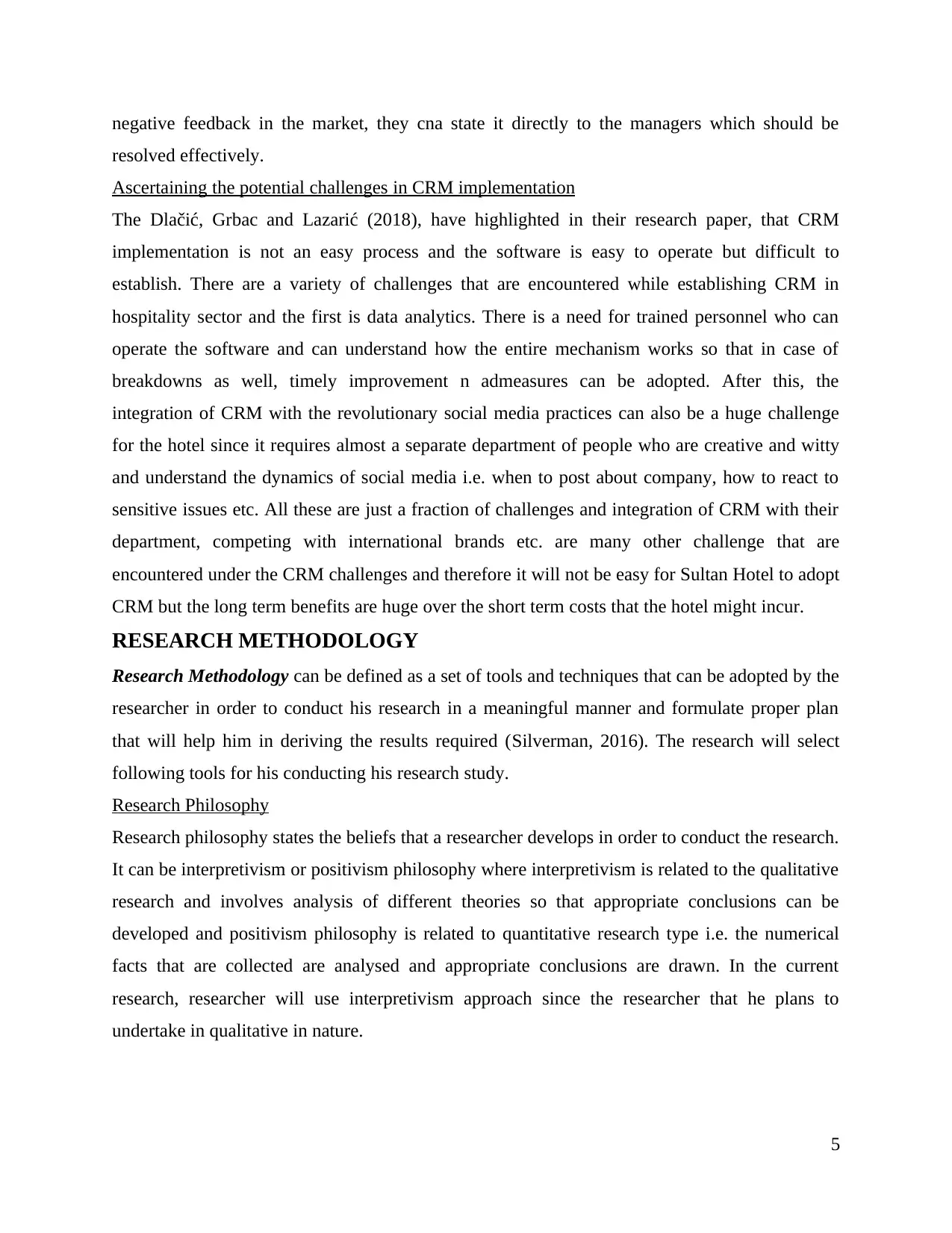
negative feedback in the market, they cna state it directly to the managers which should be
resolved effectively.
Ascertaining the potential challenges in CRM implementation
The Dlačić, Grbac and Lazarić (2018), have highlighted in their research paper, that CRM
implementation is not an easy process and the software is easy to operate but difficult to
establish. There are a variety of challenges that are encountered while establishing CRM in
hospitality sector and the first is data analytics. There is a need for trained personnel who can
operate the software and can understand how the entire mechanism works so that in case of
breakdowns as well, timely improvement n admeasures can be adopted. After this, the
integration of CRM with the revolutionary social media practices can also be a huge challenge
for the hotel since it requires almost a separate department of people who are creative and witty
and understand the dynamics of social media i.e. when to post about company, how to react to
sensitive issues etc. All these are just a fraction of challenges and integration of CRM with their
department, competing with international brands etc. are many other challenge that are
encountered under the CRM challenges and therefore it will not be easy for Sultan Hotel to adopt
CRM but the long term benefits are huge over the short term costs that the hotel might incur.
RESEARCH METHODOLOGY
Research Methodology can be defined as a set of tools and techniques that can be adopted by the
researcher in order to conduct his research in a meaningful manner and formulate proper plan
that will help him in deriving the results required (Silverman, 2016). The research will select
following tools for his conducting his research study.
Research Philosophy
Research philosophy states the beliefs that a researcher develops in order to conduct the research.
It can be interpretivism or positivism philosophy where interpretivism is related to the qualitative
research and involves analysis of different theories so that appropriate conclusions can be
developed and positivism philosophy is related to quantitative research type i.e. the numerical
facts that are collected are analysed and appropriate conclusions are drawn. In the current
research, researcher will use interpretivism approach since the researcher that he plans to
undertake in qualitative in nature.
5
resolved effectively.
Ascertaining the potential challenges in CRM implementation
The Dlačić, Grbac and Lazarić (2018), have highlighted in their research paper, that CRM
implementation is not an easy process and the software is easy to operate but difficult to
establish. There are a variety of challenges that are encountered while establishing CRM in
hospitality sector and the first is data analytics. There is a need for trained personnel who can
operate the software and can understand how the entire mechanism works so that in case of
breakdowns as well, timely improvement n admeasures can be adopted. After this, the
integration of CRM with the revolutionary social media practices can also be a huge challenge
for the hotel since it requires almost a separate department of people who are creative and witty
and understand the dynamics of social media i.e. when to post about company, how to react to
sensitive issues etc. All these are just a fraction of challenges and integration of CRM with their
department, competing with international brands etc. are many other challenge that are
encountered under the CRM challenges and therefore it will not be easy for Sultan Hotel to adopt
CRM but the long term benefits are huge over the short term costs that the hotel might incur.
RESEARCH METHODOLOGY
Research Methodology can be defined as a set of tools and techniques that can be adopted by the
researcher in order to conduct his research in a meaningful manner and formulate proper plan
that will help him in deriving the results required (Silverman, 2016). The research will select
following tools for his conducting his research study.
Research Philosophy
Research philosophy states the beliefs that a researcher develops in order to conduct the research.
It can be interpretivism or positivism philosophy where interpretivism is related to the qualitative
research and involves analysis of different theories so that appropriate conclusions can be
developed and positivism philosophy is related to quantitative research type i.e. the numerical
facts that are collected are analysed and appropriate conclusions are drawn. In the current
research, researcher will use interpretivism approach since the researcher that he plans to
undertake in qualitative in nature.
5
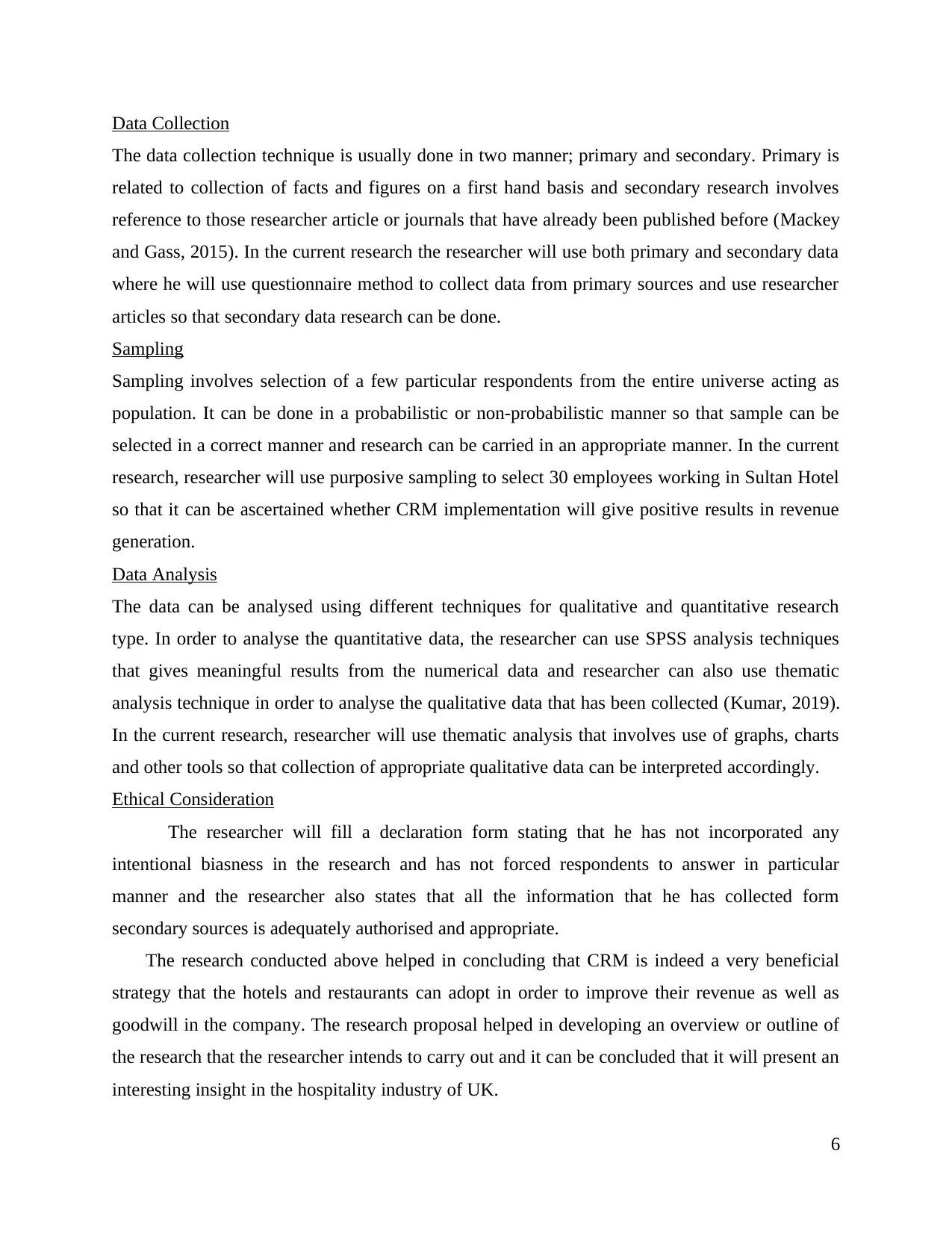
Data Collection
The data collection technique is usually done in two manner; primary and secondary. Primary is
related to collection of facts and figures on a first hand basis and secondary research involves
reference to those researcher article or journals that have already been published before (Mackey
and Gass, 2015). In the current research the researcher will use both primary and secondary data
where he will use questionnaire method to collect data from primary sources and use researcher
articles so that secondary data research can be done.
Sampling
Sampling involves selection of a few particular respondents from the entire universe acting as
population. It can be done in a probabilistic or non-probabilistic manner so that sample can be
selected in a correct manner and research can be carried in an appropriate manner. In the current
research, researcher will use purposive sampling to select 30 employees working in Sultan Hotel
so that it can be ascertained whether CRM implementation will give positive results in revenue
generation.
Data Analysis
The data can be analysed using different techniques for qualitative and quantitative research
type. In order to analyse the quantitative data, the researcher can use SPSS analysis techniques
that gives meaningful results from the numerical data and researcher can also use thematic
analysis technique in order to analyse the qualitative data that has been collected (Kumar, 2019).
In the current research, researcher will use thematic analysis that involves use of graphs, charts
and other tools so that collection of appropriate qualitative data can be interpreted accordingly.
Ethical Consideration
The researcher will fill a declaration form stating that he has not incorporated any
intentional biasness in the research and has not forced respondents to answer in particular
manner and the researcher also states that all the information that he has collected form
secondary sources is adequately authorised and appropriate.
The research conducted above helped in concluding that CRM is indeed a very beneficial
strategy that the hotels and restaurants can adopt in order to improve their revenue as well as
goodwill in the company. The research proposal helped in developing an overview or outline of
the research that the researcher intends to carry out and it can be concluded that it will present an
interesting insight in the hospitality industry of UK.
6
The data collection technique is usually done in two manner; primary and secondary. Primary is
related to collection of facts and figures on a first hand basis and secondary research involves
reference to those researcher article or journals that have already been published before (Mackey
and Gass, 2015). In the current research the researcher will use both primary and secondary data
where he will use questionnaire method to collect data from primary sources and use researcher
articles so that secondary data research can be done.
Sampling
Sampling involves selection of a few particular respondents from the entire universe acting as
population. It can be done in a probabilistic or non-probabilistic manner so that sample can be
selected in a correct manner and research can be carried in an appropriate manner. In the current
research, researcher will use purposive sampling to select 30 employees working in Sultan Hotel
so that it can be ascertained whether CRM implementation will give positive results in revenue
generation.
Data Analysis
The data can be analysed using different techniques for qualitative and quantitative research
type. In order to analyse the quantitative data, the researcher can use SPSS analysis techniques
that gives meaningful results from the numerical data and researcher can also use thematic
analysis technique in order to analyse the qualitative data that has been collected (Kumar, 2019).
In the current research, researcher will use thematic analysis that involves use of graphs, charts
and other tools so that collection of appropriate qualitative data can be interpreted accordingly.
Ethical Consideration
The researcher will fill a declaration form stating that he has not incorporated any
intentional biasness in the research and has not forced respondents to answer in particular
manner and the researcher also states that all the information that he has collected form
secondary sources is adequately authorised and appropriate.
The research conducted above helped in concluding that CRM is indeed a very beneficial
strategy that the hotels and restaurants can adopt in order to improve their revenue as well as
goodwill in the company. The research proposal helped in developing an overview or outline of
the research that the researcher intends to carry out and it can be concluded that it will present an
interesting insight in the hospitality industry of UK.
6
⊘ This is a preview!⊘
Do you want full access?
Subscribe today to unlock all pages.

Trusted by 1+ million students worldwide
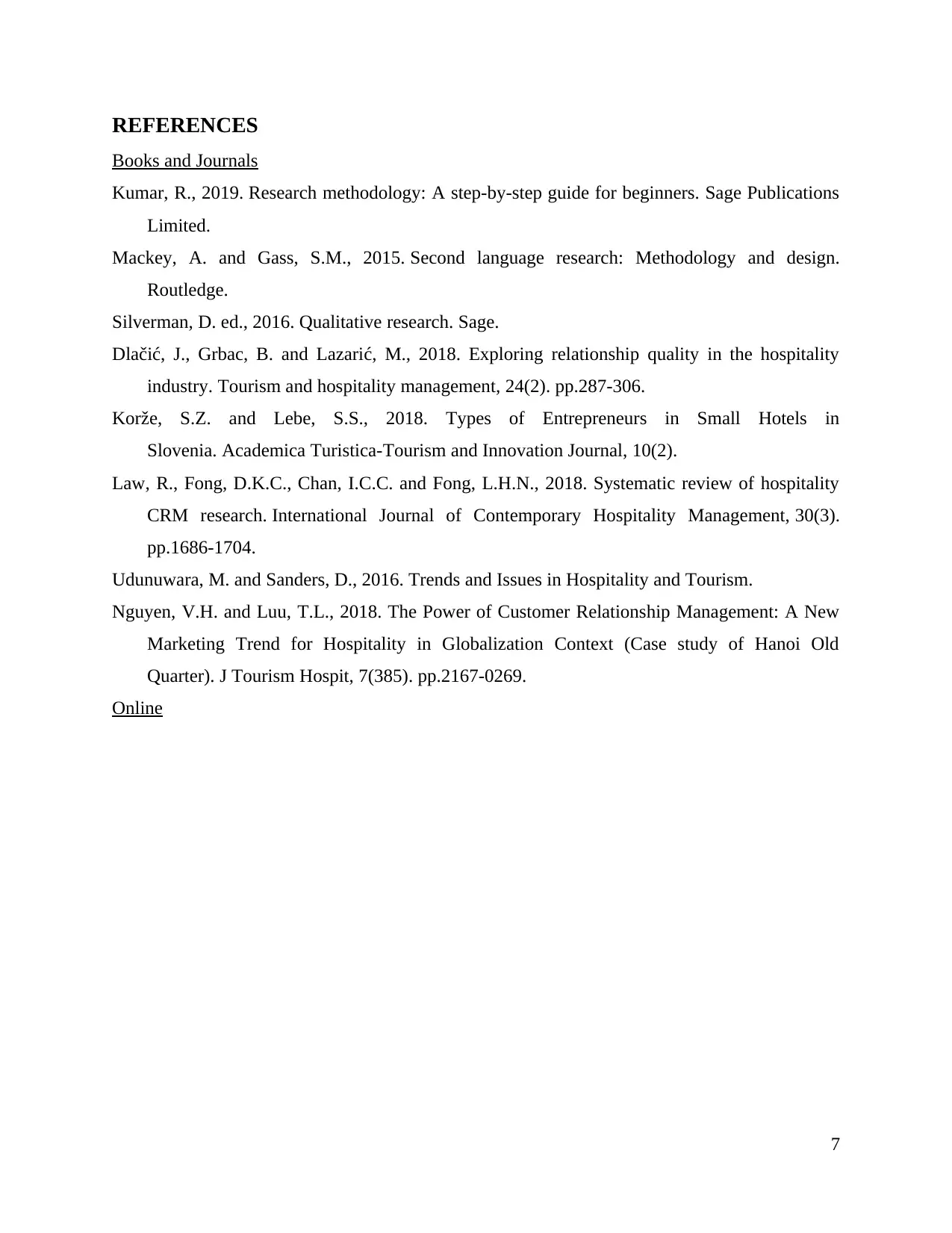
REFERENCES
Books and Journals
Kumar, R., 2019. Research methodology: A step-by-step guide for beginners. Sage Publications
Limited.
Mackey, A. and Gass, S.M., 2015. Second language research: Methodology and design.
Routledge.
Silverman, D. ed., 2016. Qualitative research. Sage.
Dlačić, J., Grbac, B. and Lazarić, M., 2018. Exploring relationship quality in the hospitality
industry. Tourism and hospitality management, 24(2). pp.287-306.
Korže, S.Z. and Lebe, S.S., 2018. Types of Entrepreneurs in Small Hotels in
Slovenia. Academica Turistica-Tourism and Innovation Journal, 10(2).
Law, R., Fong, D.K.C., Chan, I.C.C. and Fong, L.H.N., 2018. Systematic review of hospitality
CRM research. International Journal of Contemporary Hospitality Management, 30(3).
pp.1686-1704.
Udunuwara, M. and Sanders, D., 2016. Trends and Issues in Hospitality and Tourism.
Nguyen, V.H. and Luu, T.L., 2018. The Power of Customer Relationship Management: A New
Marketing Trend for Hospitality in Globalization Context (Case study of Hanoi Old
Quarter). J Tourism Hospit, 7(385). pp.2167-0269.
Online
7
Books and Journals
Kumar, R., 2019. Research methodology: A step-by-step guide for beginners. Sage Publications
Limited.
Mackey, A. and Gass, S.M., 2015. Second language research: Methodology and design.
Routledge.
Silverman, D. ed., 2016. Qualitative research. Sage.
Dlačić, J., Grbac, B. and Lazarić, M., 2018. Exploring relationship quality in the hospitality
industry. Tourism and hospitality management, 24(2). pp.287-306.
Korže, S.Z. and Lebe, S.S., 2018. Types of Entrepreneurs in Small Hotels in
Slovenia. Academica Turistica-Tourism and Innovation Journal, 10(2).
Law, R., Fong, D.K.C., Chan, I.C.C. and Fong, L.H.N., 2018. Systematic review of hospitality
CRM research. International Journal of Contemporary Hospitality Management, 30(3).
pp.1686-1704.
Udunuwara, M. and Sanders, D., 2016. Trends and Issues in Hospitality and Tourism.
Nguyen, V.H. and Luu, T.L., 2018. The Power of Customer Relationship Management: A New
Marketing Trend for Hospitality in Globalization Context (Case study of Hanoi Old
Quarter). J Tourism Hospit, 7(385). pp.2167-0269.
Online
7
Paraphrase This Document
Need a fresh take? Get an instant paraphrase of this document with our AI Paraphraser

8

9
⊘ This is a preview!⊘
Do you want full access?
Subscribe today to unlock all pages.

Trusted by 1+ million students worldwide
1 out of 9
Related Documents
Your All-in-One AI-Powered Toolkit for Academic Success.
+13062052269
info@desklib.com
Available 24*7 on WhatsApp / Email
![[object Object]](/_next/static/media/star-bottom.7253800d.svg)
Unlock your academic potential
Copyright © 2020–2026 A2Z Services. All Rights Reserved. Developed and managed by ZUCOL.





